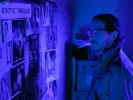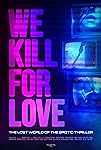Eye For Film >> Movies >> We Kill For Love (2023) Film Review
We Kill For Love
Reviewed by: Jennie Kermode

If you’re old enough to remember video rental shops, you may remember seeing them there on the shelves. They took up a remarkable amount of space, and yet it was often difficult to tell them apart. Their titles were mostly variants on the same few words – passion, lust, dangerous, deadly, seduction, instinct, obsession and so on, represented here as fridge magnets – and half of them starred Michael Douglas or Shannon Tweed. Sometimes people buying them would be a little shy and surreptitious about it. Certainly nobody pretended they were great art – and yet the erotic thriller genre continues to be dear to many filmmakers’ hearts. Whatever happened to it?
To explore its history, as Anthony Penta does here, is fraught with difficulties. Many films from the era are lost altogether; others survive only on decaying VHS tapes or the occasional laserdisc. In the latter days of the era they were piled high and sold cheap, so nobody thought of hanging onto them. Genre stars interviewed for the documentary reveal that even they find it difficult to remember individual films in the blur of similar material. Nevertheless, Penta does a decent job of tracking the progress of the genre and highlighting key titles whilst simultaneously exploring its origins.

Erotic thrillers were very much a product of the emergence of home video. Before that, one watched what was on television, or went to a cinema, but there was little real choice. Making films was expensive so quality was important, making it difficult to experiment, especially with themes which were unlikely to attract support from arts funding bodies. Mainstream cinema offered romance; underground cinema offered pornography; and there was very little in between. Video, however, meant that suddenly there was a market for films which people could watch at home with no strangers present, and which, whilst delivering titillation, had enough story to escape the stigma of porn. Couples could watch them together. They could pretend they were doing so for the sake of the plot. Sometimes it was even true.
The roots of the genre, however, are deeper than that. Penta addresses the influence of film noir, with its dangerous, seductive femmes fatales and frequent murder plots. He also looks at the wider thriller genre, and particularly Hitchcock. (One cannot look at the architectural shots which open Paul Verhoeven’s Basic Instinct without thinking of Hitchcock.) This leads to reflection on Rebecca and the Gothic, with women in lacy nightgowns fleeing wealthy men with troubled pasts. Perhaps these origins go some way to explaining why erotic thrillers are such a peculiarly white phenomenon, with people of colour appearing only late in the game, and practically no mixed-race couples. The danger they involve is carefully packaged for middle class white American viewers and steers clear of the country’s deeper sexual anxieties.
The evolution of the genre would, inevitably, see new anxieties emerge. It provides an interesting mirror by way of which to reflect on US society during the early years of the AIDS epidemic. There’s a suggestion that it also addressed a developing crisis of masculinity, though the theories espoused here don’t go very deep, and there is some commentary on the development of feminism which is notable for its naivety, treating it as a unified school of thought. It is notable that the genre increasingly foregrounds women’s perspectives and portrays them as people who can be motivated by sexual desire, something which has become rarer in today’s cinema. This would be particularly plain in the Red Shoe Diaries series which emerged from the genre.
Penta positions Fatal Attraction as an ur-text for the genre, and takes the opportunity to discuss the issues with its ending, which was mangled by test audiences whose misogyny is perhaps easier for some viewers to appreciate from a distance. He also singles out Brian De Palma’s Dressed To Kill as a template for many films which followed it, and there are sufficient clips here for any viewer to recognise the repeated efforts to ape his camera angles. Then there’s 9 ½ Weeks, which gave the genre a shot in the arm at a stage when it was struggling. One might reflect that Kim Basinger is one of few women to have risen to stardom within this genre and gone on to build a successful career in more ‘respectable’ films.
After VHS, of course, there was cable TV. There’s an amusing look here at the hopelessness of early Playboy Channel efforts to engage with the craze, and at how it was subsequently reshaped. But now there is streaming, so why didn’t erotic thrillers simply find a new home? Arguably they did – there are still a few of them out there – but, this documentary suggests, they fell victim to their own success. In a flooded market, viewers found it hard to identify which ones were worth their time; budgets were cut, production was squeezed, and quality plummeted. Over time, mainstream cinema became more conservative about sex and almost completely ceased to use it as a narrative instrument. No more tightly clutched white sheets, no more saxophone solos, no more leggy blondes in sleek red cars tempting husbands to stray. Or at least, not for the meantime. The world has since changed in other ways, and one wonders how this profoundly heterosexual genre might manifest today. Some directors have begun to explore this.
Thorough and insightful, Penta’s film benefits from fantastic editing (his own) and from a self-consciousness about the viewer’s gaze which aptly reflects the genre it’s exploring. It’s a love letter to films which, for all their darkness, celebrated sexual desire, and to what seemed for a while like the opening up of a much needed conversation, cut off too soon.
Reviewed on: 01 Sep 2023















